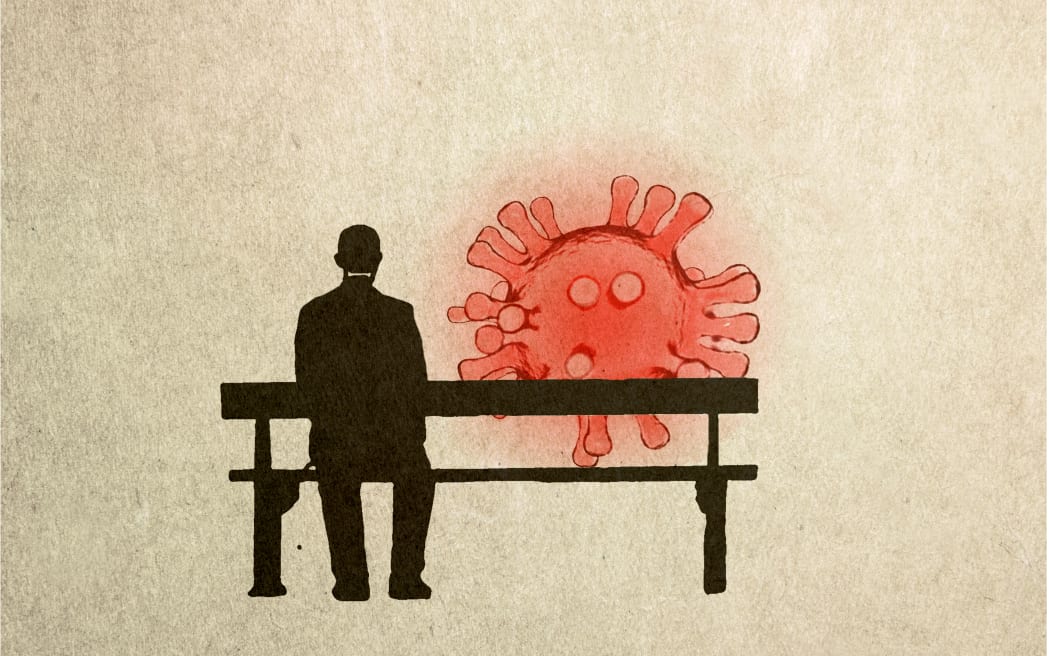A physician at Yale University's Long Covid clinic says she is optimistic that the core of the problem will be found.
It has been reported that one in five Covid-19 sufferers in New Zealand go on to develop Long Covid.
Otago University estimated that up to 150,000 New Zealanders may be battling, or have been battling Long Covid, while another estimate was up to 300,000 earlier this year.

Photo: FANATIC STUDIO / SCIENCE PHOTO L
The only publicly-funded Long Covid clinic in the country will shut up shop at the end of this month.
Symptoms include chronic fatigue and brain fog that leave people unable to carry out normal day-to-day tasks.
Yale University's Dr. Lisa Sanders is a physician and professor of internal medicine.
She is currently running the university's Long Covid clinic and doing all she can to understand the mysteries that surround the disorder.
Speaking to Sunday Morning, Sanders said Covid-19 affected a "huge" number of people.
"The United States just got obliterated. So many people had it, so many people died and it was so politicised that it was just insane, so now it's not clear what the percentage is but it seems like between 8 and 10 percent of all the people who had Covid will have Long Covid."
Sanders spends up to an hour speaking with each patient who comes to the clinic for help.
"I know so many of these people have been so frustrated by people not believing that what they're feeling Is real because there's no test that shows that you have this. For many of these people, it's been a terrible journey."
"If I were going to be in a clinic where they wanted me to rush people through, it would've been completely unappealing to me because these are people who need to be heard, haven't been heard, need to be cared for and about...
"I think that medicines is what people want, even though we know for sure that most people who are prescribed long-term medicines don't take them the way they're supposed to, somehow it feels like a real cure if you're taking a pill and it feels like a real disease if there's a pill for it."
Sanders said the symptoms that come with Long Covid can be related to symptoms written about from the Russian Flu in the late 1800s that "flattened" many people and the 1918 influenza.
"People who talk about fatigue and brain fog, I mean they didn't used to use those words but if you read the description of what happened to them, you can see that it's not so very different to what happens to patients who have Long Covid."
Much like with Long Covid, Sanders said there were people following the 1918 influenza pandemic that were just too tired to do anything - "a very Long Covid-type presentation".
'Inflammation'
Sanders said researchers are still trying to determine what it is in the body that causes Long Covid.
"I think it's very disabling, and there have been terrifying numbers or estimations of people who have not been able to go back to work, and certainly, I see them in this clinic here."
There were many things that researchers had discovered and thought "this is it" but had turned out not to be so.
Once the population could be defined, further study could be done to determine what those people had in common.
One thing Sanders said a lot of her patients described feeling was "inflammation".
"I don't quite know what they mean by that…"
"So many patients use that word, I wonder about it and yet, the way that we normally look for inflammation, those markers are usually not elevated. They don't show any signs of systemic inflammation, so they feel like they're inflamed which is such an odd word and so many people use it so clearly people feel something but it's not showing up in our tests."
Another word heard often was "exhaustion", she said.
"One patient told me that she felt like every cell in her body was exhausted."
And Sanders said there was some evidence that proved that to be true - with some people with Long Covid having problems with their mitochondria.
"One of the things that I have definitely seen in these patients, not 100 percent but a lot, is that they're very deconditioned and some of that is that when they had Covid, they were down and out for weeks or months and haven't really felt like they should push themselves because they are worried because they are so tired, or it makes them feel bad, or they have chronic fatigue syndrome.
"When they push themselves, they often crash the next day."
No treatment for Long Covid - yet
At this stage, there was no one treatment for Long Covid, Sanders said.
"All we can treat are the various ways that it bubbles up to the surface and causes suffering.
"Very few of them have evidence to show that they actually work, but we're trying."
Sanders said she was optimistic that the cause of Long Covid would be found.
Maybe "foolishly so", but she was optimistic nonetheless.
"Because it's affected so many people, there are so many smart people who are trying to figure this out. Here at Yale, some of the smartest people I know are working on this…"
But Sanders was clear in her opinion that despite women being more prone to Long Covid than men, enough men experienced it for it to be considered a very real thing.
"I can assure you that if it was just women who had it, we would not be having this conversation."

